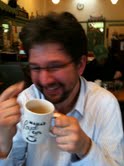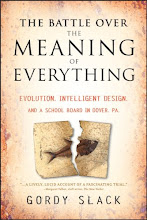Friday, August 27, 2010
Eternal Sunshine of the Traumatized Mind
Terry McDermott's good book, 101 Theory Drive: A Neuroscientist's Quest for Memory, tells the story of Gary Lynch a UC Irvine biologist who's spent his entire career looking for the material basis of memory in the brain. According to Lynch's hypothesis, the brain employs Long Term Potentiation (LTP) to convert experience into lasting synaptic relationships. Once considered fringe, the LTP explanation of memory--physical connections between brain cells are made stronger when they communicate, making subsequent communication more efficient--is now mainstream. But the precise mechanisms remained a mystery until Lynch's lab began to shed light on them in the past few years.
The juice is in the details, but basically Lynch found that synapses change their relationships to their neighbors by changing the shape of their dendritic spines. I'll come back to the book soon (when I finish it), but I have to mention it now because instead of finishing McDermott I just watched Eternal Sunhine of the Spotless Mind, the 2004 Oscar winning movie about memory erasing technology. It's a great film, even more fun to watch than 101 Theory Drive is to read. I can't help drawing a line between the two since Gary Lynch's Big Hope is that by explaining LTP he can then begin to locate individual memories, to make, in his words, a "memory map" of the brain. That's essentially what Dr. Howard Mierzwiak, played by Tom Wilkinson, does in Eternal Sunshine. He explains that there is an emotional core which gives away the location of each of our memories and, out of his shabby little Brooklyn clinic, Mierzwiak maps his patients' painful memories and removes them like errant hairs.
In mid-treatment, Joel Barish (Jim Carrey), who is trying to escape the agony of his broken heart, realizes that his memories are, well, important, even if they hurt. He and his ex, played by Kate Winslet, play hide-and-seek through Barish's memory, hiding (camouflaged by emotional traumas) in unexpected memory regions (like exile under the kitchen table from Barish's childhood) that the good doctor can't find...or can't conscience removing.
A real memory-altering therapy is being studied at Massachusetts General Hospital, according to an excellent article by Charles Slack in the current issue of Proto. Harvard psychiatrist Roger Pitman is giving propranolol, a beta-blocker commonly used to regulate heartbeats in arrhythmia patients, to soldiers suffering from Post Traumatic Stress Disorder (PTSD). Propranolol seems to counteract the effect of stress hormones that bloom when traumatic memories are recalled. The test subjects keep the memory, but seem to lose the intense emotion associated with it. Not yet tried, as far as I know, on suffering lovers, like the Jim Carrey and Kate Winslet characters in Eternal Sunshine. But if it works, its just a matter of time before psychiatrists use it to erase all kinds of memory pain. Imagine the power of being able to regulate the emotional volume of bad memories. Especially if you had a memory map to guide you. For one thing, you could keep sending traumatized soldiers back into the killing fields again and again. Or hapless romantics back into the battlefields of love.
Good? Bad? I don't know.
Subscribe to:
Post Comments (Atom)



1 comment:
I suffered many years with a debilitating condition called atrial fibrillation. That's an abnormal heart rhythm in which the upper two chambers of the heart quiver instead of giving a steady beat, which can prevent the blood from getting to the organs efficiently. It also puts one at risk of getting a blood clot which could cause a stroke. Atrial fibrillation kept me from walking and exercising.
Progonol Calm PRT
Post a Comment